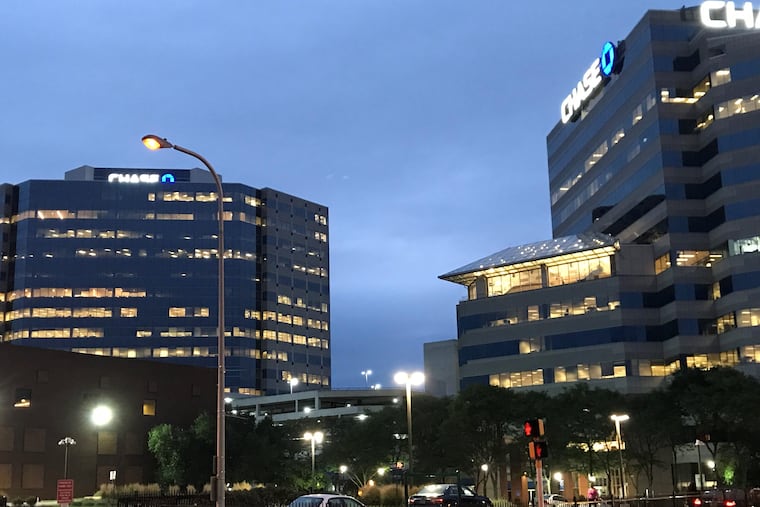JPMorgan Chase plans 50 Philly branches as other banks close
"Customers tell us they want branches": Millennials stop by once a month.

JPMorgan Chase & Co., the largest U.S. bank, plans to open 50 branches in the Philadelphia area over the next five years, as other big banks have been shutting branches and customers turn to digital banking.
The New York company plans to announce its Philly plans as its chief executive, Jamie Dimon, visits Center City on Monday to address the nonprofit World Affairs Council of Philadelphia on "the role of business in society, the state of the economy, and creating economic opportunity in our communities," according to the council.
"The Delaware Valley is a critically important market to our branch expansion and growth as a firm," Dimon said in a statement, citing "more than one million" credit card, home loan, and other consumer clients, plus 30,000 business clients, in the area.
JPMorgan Chase employs 11,000 in the metro Philly region, mostly at its Wilmington credit card, investment, and tax shelter offices; a Fairfax, Del., technology center; a Newark, Del., transactions-compliance center; and other offices near the University of Delaware, where the bank is a major recruiter. That headcount ranks JPMorgan alongside Merck, Wawa, Comcast, and Vanguard among the region's top corporate employers.
Philadelphia-area banks have shut 330 branches in the last 10 years, reducing the number of neighborhood bank offices to 1,659, according to Federal Deposit Insurance Corp. data. Six lenders that operated at least 100 branches in the region in 2008 — TD, Wells Fargo, PNC, Citizens, Bank of America, and the banks that consolidated into BB&T — have each shut 20 to 40 branches since then.
Only a handful of banks, including former Commerce Bank chief Vernon Hill's Republic Bank and former Sovereign Bank boss Jay Sidhu's Customers Bank, have added new branches in the last decade. JPMorgan's New York rival, Citigroup, spent more than $50 million building a Philly-area branch network that it shuttered in 2013, calling the market unprofitable.
But "customers tell us they want branches," says Thasunda Duckett, head of JPMorgan Chase's consumer banking group. The bank wants mortgage, credit card, and small-business borrowers it deals with by phone and mail to walk in, open deposit accounts, and buy investments. "Two-thirds of customers visit a branch four times every quarter," Duckett said. "For millennials, it's three times a quarter."
Dimon said last spring he planned to pump billions into a total of 400 new offices, loans, and other projects in several U.S. markets including Philadelphia, after President Trump's tax cuts boosted his bank's already-soaring profits. The bank earned $24 billion, after taxes, last year, and is on track this year to earn a record $30 billion.
JPMorgan Chase plans to hire 300 to staff the branches, with entry-level wages at $16.50, plus health care, retirement, and tuition benefits. By comparison, Beneficial Bank, the largest bank based in Philadelphia, until recently started at $14; WSFS Financial Corp., which has agreed to buy Beneficial, says it will boost that to $15.
As regional director, JPMorgan Chase has hired Michele Lawrence, a former Wells Fargo executive who unsuccessfully sought the Democratic nomination last Spring to represent Philadelphia in Congress. Jodi Dayborn, formerly with Citizens Bank's Northeast Philadelphia district, is Lawrence's new market director for banking.
JPMorgan Chase plans offices in the 500 block of Federal Street, Camden, in November; other near its offices around Philadephia's 1600 block of Walnut Street and at Second and North Walnut in Wilmington and on Lancaster Avenue in wealthy Villanova, later in the fall; and in the 1600 block of JFK Boulevard, on US 130 in Burlington, and in Newark, Del., next year, with others to follow. A company rendering shows a future branch on the Penn campus, transient home to many New Yorkers.
A branch network will also be convenient for professionals who shuttle back and forth between Philly and the bank's New York base, including Comcast staff moving between its Center City headquarters and New York-area media properties. The companies have close ties: JPMorgan Chase is one of the media giant's lead banks; Dimon attended Harvard Business School with Steve Burke, now chief executive of Comcast's NBC Universal and a JPMorgan director; Comcast chief financial officer Michael J. Kavanaugh held the same job at JPMorgan under Dimon.
JPMorgan Chase says it's targeting poorer neighborhoods, too. The JPMorgan Chase Foundation has committed $5 million over the next three years for "mixed-use" apartment and business projects in Kensington, and "technical assistance" to small firms, through an umbrella group — "Kensington del Corazon Collaborative" — including Philadelphia LISC (Local Initiative Support Coalition), Finanta (Financing and Technical Advice), the Impact Loan Fund, and the Community First Fund, said Janis Bowdler, president of the JPMorgan Chase Foundation. Goals include to "attract or retain 85 small businesses, create or preserve 300 jobs, and raise $5 for every dollar from Chase," and to help residents participate in neighborhood recovery, instead of being forced out, she added.
The company also said it was setting up Spectrum Scholars, a job program for computer science and engineering students with autism, in partnership with the University of Delaware.
In a statement, Philadelphia Mayor Kenney said he was "proud" to welcome JPMorgan Chase's expansion and Kensington initiative, which he said would help "put more residents on a pathway to prosperity, revitalize neighborhoods, and strengthen our local economy."
Chief executive Dimon, a onetime protégé of Citigroup empire builder Sandy Weill, joined JPMorgan Chase when it acquired the company he previously headed, Bank One, in 2004. Bank One owned the former First USA Bank, whose cofounder, Richard W. Vague, had built it into one of the biggest U.S. credit card lenders. That group forms the base of JPMorgan's current operations in the region.